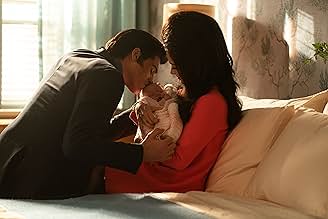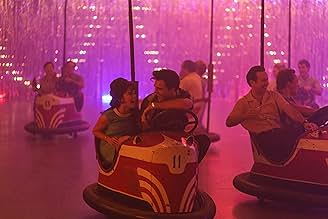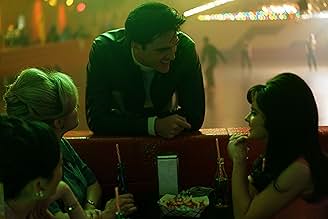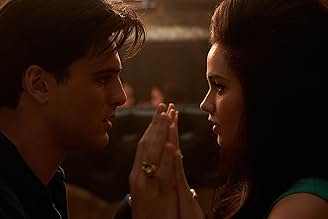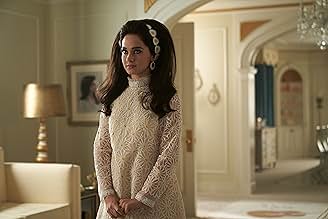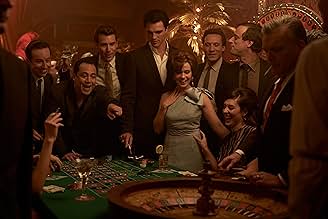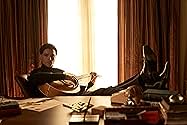Lorsque l'adolescente Priscilla rencontre Elvis, l'homme qui est une superstar du rock and roll devient quelqu'un de totalement inattendu en privé: un béguin passionnant, un allié dans la so... Tout lireLorsque l'adolescente Priscilla rencontre Elvis, l'homme qui est une superstar du rock and roll devient quelqu'un de totalement inattendu en privé: un béguin passionnant, un allié dans la solitude, un meilleur ami vulnérable.Lorsque l'adolescente Priscilla rencontre Elvis, l'homme qui est une superstar du rock and roll devient quelqu'un de totalement inattendu en privé: un béguin passionnant, un allié dans la solitude, un meilleur ami vulnérable.
- Director
- Writers
- Stars
- Prix
- 6 victoires et 33 nominations au total
Dan Beirne
- Joe
- (as Daniel Beirne)
Avis en vedette
Priscilla does really well when it comes to cinematography and direction. There are good shots in the movie and Coppola did an amazing job as director.
However, the screenplay was very disappointing to me. The story feels slow at times and gets into a repetitive cycle after a while: Elvis does something horrible to Priscilla, they fight, Priscilla hesitates to leave him, and finally forgives him for unexplainable reasons. And in the end, when she finally leaves him, we don't know what finally made her make the decision, she just leaves. Moreover, I was expecting to see more of Priscilla's life where Elvis is not a central part of the story, as the title might have suggested, but the film starts when she meets him and ends when he is no longer part of her life.
Apart from that, I think Cailee Spaeny did an incredible job and is the highlight of the movie. I have mixed feelings about Jacob Elordi, at times he felt like the perfect choice for the role, but other times it felt like I was watching his Euphoria character.
The movie is a beautifully decorated but empty box.
However, the screenplay was very disappointing to me. The story feels slow at times and gets into a repetitive cycle after a while: Elvis does something horrible to Priscilla, they fight, Priscilla hesitates to leave him, and finally forgives him for unexplainable reasons. And in the end, when she finally leaves him, we don't know what finally made her make the decision, she just leaves. Moreover, I was expecting to see more of Priscilla's life where Elvis is not a central part of the story, as the title might have suggested, but the film starts when she meets him and ends when he is no longer part of her life.
Apart from that, I think Cailee Spaeny did an incredible job and is the highlight of the movie. I have mixed feelings about Jacob Elordi, at times he felt like the perfect choice for the role, but other times it felt like I was watching his Euphoria character.
The movie is a beautifully decorated but empty box.
It is 1949, and American teenager Priscilla Beaulieu is in Germany with her parents. At a party one night, she meets Elvis Presley, who is stationed in the same military base as her father. The King is drawn to her, while she is smitten by his down-to-earth charm and seemingly genuine humanity. As time goes on, the two forge a relationship, and by 1963, she is living with him in Memphis. However, being The King's wife proves more difficult than she imagined, and far more lonesome.
Written and directed by Sofia Coppola, and based on 'Elvis and Me' by Priscilla Presley and Sandra Harmon, 'Priscilla' is a visually evocative drama both striking and flawed. Firstly, the title is something of a misnomer, as this is not the story of Priscilla Presley's life, rather an overview of the years she spent with Elvis (one wonders why the source material's title was not retained). The narrative focuses on her growing isolation, trapped in Graceland, at the beck and call of her controlling husband. However, due to Coppola's cold approach to the themes of agency and control, her examination of same leaves one oddly unmoved.
Moreover, despite the fact that she is ostensibly the central character, we aren't offered insight into Priscilla's motivations, or aspirations, nor does she have much of a personality. She is a soft-spoken, kind-hearted girl at the beginning and- for all intents and purposes- the very same at the end. Coppola's dialogue lacks wit, while Sarah Flack's ponderous editing leaves proceedings feeling lethargic- all the more so due to the dearth of characterisation and dialogue therein.
Some critics are quick to state that the film is purposefully superficial, that Coppola is interested only in the surface level. By focusing on the skin, as it were, and not the heart beneath, she re-enforces the idea that everything in Elvis's life was an easily purchasable object, even Priscilla. However, as the title would suggest, this is not meant to be a movie about Elvis. Therefore, the scant character development or depth with regard to Priscilla is alienating. We don't have much reason to root for her, except as a result of the obvious distaste engendered by Elvis's mood swings and controlling behaviour.
As a result, the audience feels detached from proceedings, disconnected from the characters both emotionally and psychologically. Although Coppola creates a more human version of The King than viewers saw in Baz Luhrman's 'Elvis' or Liza Johnson's 'Elvis & Nixon', by demythologizing and bringing him down to earth, much of his charisma is diluted. The film's version of the man is a brooding, volatile control freak, without much magnetism or charm. Furthermore, secondary characters are barely more than shadows in darkness; you can hardly make them out at all.
Conversely, Coppola - and frequent collaborator Philippe Le Sourd's - cinematography is stunning. Their composition makes Priscilla appear small and out of place compared to Elvis, like a China doll discarded in a playground. Their use of juxtaposing colours adds to the luxury of Graceland, as well as to Priscilla's isolation, while the soft lighting throughout lends the film an air of romance and intimacy. Everything in the film drips with textural richness, immersing the viewer in a lavish, decadent world, where every surface glistens with silk, velvet and gold.
In addition, Stacey Battat's costume design contributes to the personalities of the characters astutely (perhaps more so than Coppola's screenwriting), heightening the visual contrast between Elvis and Priscilla. Her costume, makeup and hairstyle changes, in particular, mirror her evolution from a shy girl to an independent woman- even if Coppola's screenplay doesn't detail that journey; Priscilla's varying appearance does. Additionally, Tamara Deverell's intricate production design- as well as the set decoration from Patricia Cuccia- lends the film authenticity and realism.
Moreover, the soundtrack is stirring, utilising both modern and period pieces. Although Elvis's estate refused permission for any of his songs to be used, Coppola makes excellent use of tracks by the likes of Dolly Parton and The Ronettes, bolstering the narrative's themes. Contemporary music is interwoven cleverly into proceedings, never feeling as jarring and out of place as it does in the aforementioned Luhrman's efforts, complementing things nicely.
Cailee Spaeny stars as Priscilla, opposite Jacob Elordi as Elvis. Spaeny displays Priscilla's innocence subtly, being nuanced and understated. Although there really isn't much for her to work with, she overcomes the limited characterisation of the role, while handling dull dialogue with ease. Similarly, Elordi makes Coppola's angsty, moody version of Elvis an interesting, multifaceted character. He might not really look like The King, but he shares a good chemistry with Spaeny. Unfortunately, a parade of supporting actors- notably Dagmara Dominczyk and Ari Cohen as Priscilla's parents- are largely wasted, given little to do.
In conclusion, Sofia Coppola's 'Priscilla' is trying to say some interesting things about fame, agency and control, but never gets around to saying them. Coppola's narrative is too cold and calculated, while her characterisation and dialogue are too minimalist to make much impact. Conversely, the cinematography and production design are striking, while the stirring score complements proceedings cleverly. Cailee Spaeny does fine work as the titular character, as does her co-star Jacob Elordi as Elvis. Although it has its moments, it's a moody blue film that suspicious minds might want to return to sender.
Written and directed by Sofia Coppola, and based on 'Elvis and Me' by Priscilla Presley and Sandra Harmon, 'Priscilla' is a visually evocative drama both striking and flawed. Firstly, the title is something of a misnomer, as this is not the story of Priscilla Presley's life, rather an overview of the years she spent with Elvis (one wonders why the source material's title was not retained). The narrative focuses on her growing isolation, trapped in Graceland, at the beck and call of her controlling husband. However, due to Coppola's cold approach to the themes of agency and control, her examination of same leaves one oddly unmoved.
Moreover, despite the fact that she is ostensibly the central character, we aren't offered insight into Priscilla's motivations, or aspirations, nor does she have much of a personality. She is a soft-spoken, kind-hearted girl at the beginning and- for all intents and purposes- the very same at the end. Coppola's dialogue lacks wit, while Sarah Flack's ponderous editing leaves proceedings feeling lethargic- all the more so due to the dearth of characterisation and dialogue therein.
Some critics are quick to state that the film is purposefully superficial, that Coppola is interested only in the surface level. By focusing on the skin, as it were, and not the heart beneath, she re-enforces the idea that everything in Elvis's life was an easily purchasable object, even Priscilla. However, as the title would suggest, this is not meant to be a movie about Elvis. Therefore, the scant character development or depth with regard to Priscilla is alienating. We don't have much reason to root for her, except as a result of the obvious distaste engendered by Elvis's mood swings and controlling behaviour.
As a result, the audience feels detached from proceedings, disconnected from the characters both emotionally and psychologically. Although Coppola creates a more human version of The King than viewers saw in Baz Luhrman's 'Elvis' or Liza Johnson's 'Elvis & Nixon', by demythologizing and bringing him down to earth, much of his charisma is diluted. The film's version of the man is a brooding, volatile control freak, without much magnetism or charm. Furthermore, secondary characters are barely more than shadows in darkness; you can hardly make them out at all.
Conversely, Coppola - and frequent collaborator Philippe Le Sourd's - cinematography is stunning. Their composition makes Priscilla appear small and out of place compared to Elvis, like a China doll discarded in a playground. Their use of juxtaposing colours adds to the luxury of Graceland, as well as to Priscilla's isolation, while the soft lighting throughout lends the film an air of romance and intimacy. Everything in the film drips with textural richness, immersing the viewer in a lavish, decadent world, where every surface glistens with silk, velvet and gold.
In addition, Stacey Battat's costume design contributes to the personalities of the characters astutely (perhaps more so than Coppola's screenwriting), heightening the visual contrast between Elvis and Priscilla. Her costume, makeup and hairstyle changes, in particular, mirror her evolution from a shy girl to an independent woman- even if Coppola's screenplay doesn't detail that journey; Priscilla's varying appearance does. Additionally, Tamara Deverell's intricate production design- as well as the set decoration from Patricia Cuccia- lends the film authenticity and realism.
Moreover, the soundtrack is stirring, utilising both modern and period pieces. Although Elvis's estate refused permission for any of his songs to be used, Coppola makes excellent use of tracks by the likes of Dolly Parton and The Ronettes, bolstering the narrative's themes. Contemporary music is interwoven cleverly into proceedings, never feeling as jarring and out of place as it does in the aforementioned Luhrman's efforts, complementing things nicely.
Cailee Spaeny stars as Priscilla, opposite Jacob Elordi as Elvis. Spaeny displays Priscilla's innocence subtly, being nuanced and understated. Although there really isn't much for her to work with, she overcomes the limited characterisation of the role, while handling dull dialogue with ease. Similarly, Elordi makes Coppola's angsty, moody version of Elvis an interesting, multifaceted character. He might not really look like The King, but he shares a good chemistry with Spaeny. Unfortunately, a parade of supporting actors- notably Dagmara Dominczyk and Ari Cohen as Priscilla's parents- are largely wasted, given little to do.
In conclusion, Sofia Coppola's 'Priscilla' is trying to say some interesting things about fame, agency and control, but never gets around to saying them. Coppola's narrative is too cold and calculated, while her characterisation and dialogue are too minimalist to make much impact. Conversely, the cinematography and production design are striking, while the stirring score complements proceedings cleverly. Cailee Spaeny does fine work as the titular character, as does her co-star Jacob Elordi as Elvis. Although it has its moments, it's a moody blue film that suspicious minds might want to return to sender.
Before Elvis Presley's daughter Lisa Marie passed away earlier this year, she was quite contemptuous over Sofia Coppola's portrayal of her parents in her biographical feature Priscilla. Based on Priscilla Presley's 1985 memoir Elvis and Me, the film has nonetheless garnered mostly positive reviews and even earned Cailee Spaeny the Volpi Cup for Best Actress at the 2023 Venice Film Festival. Given that Priscilla herself was an executive producer on this project, it's best to look at this project at a more earnest portrayal of Elvis and Priscilla instead of it being romanticized or sugar coated.
Now as this film depicts the courtship between a then 14 year old Priscilla and a then 24 year old Elvis, the biggest takeaway from this feature is that it's supposed to comment more on the idea of love being difficult to obtain as the wife of a global superstar. While it does depict a taboo romantic subject in mind, it becomes far more toxic when Elvis proves to be far more manipulative and abusive than his rockstar persona claims otherwise. Cailee Spaeny and Jacob Elordi share quite a conflicting bond as their depictions show a more disturbing underbelly to what the public thought of the Presleys otherwise. Coppola makes sure to emphasize the unfortunate implications behind their relationship without directly endorsing it, especially as we can see how much the spousal torment and jadedness behind the life of fame creates more misery in Priscilla than to the people worried for her like her parents and socialites. Behind all the rock & roll, glamour and pizazz lies a hollow marriage where one is no longer illusioned to much of anything, be it romance or appreciation for the music.
That being said, outside of the disturbing implications behind Priscilla and Elvis' courtship, there really isn't much else to take away from the movie. By putting so much of Priscilla's perspective into the limelight, the portrayal of her husband isn't interesting enough to dissect beyond him being a fake charming guy who more so likes the idea of a soul mate instead of actually being with one consistently. It doesn't help that the film rushes certain plot points just to get to Presley's life of prestige, such as Priscilla's time with her rightfully concerned family, her trouble focusing in school and even the implied drug addictions she and her husband faced. Despite that latter key point playing a big role in Elvis' abusive behavior, it isn't explored enough to leave much of a dramatic impact. In fact, for a film that tries to incorporate themes of domestic abuse, it feels surprisingly lacking in showing much of that tension. Also, once the film ends, it feels as if it missed the opportunity to go more into Priscilla's life after leaving Elvis for good, almost as if it felt it didn't need to tell more when it should have.
Outside of those qualities, the filmmaking is competent enough yet never rises above decently well crafted in depicting the era of subject. The cultural aesthetic of the late 50s and early to mid 60s feels more tact on for the sake of the time period, as outside of some of the road shows and projects Elvis is apart of, only the costuming sticks out the most, and yet the film hardly does much with them to make much of an impression. If anything, the pop cultural influence from this era feels more like an accompaniment to the story than really playing much of a role beyond the media playing up Elvis' life as more than it really is. Also, the lack of much of a background score surprisingly doesn't work as most of the scenes play out with an awkward tension that would have benefited from more than just what's on the soundtrack. Speaking of which, for some reason there are all kinds of retro and contemporary rock and jazz songs except from the king himself. Perhaps given the involvement of Priscilla Presley and her ex-husband's enterprises, this comes off as understandable yet confusing.
So while made with earnest intentions and captivating performances, Priscilla is a decent enough biopic that falls flat in exploring more about its subject matter beyond superficial love and all the glitz and glamour that comes with it. I would recommend this on the grounds that it's more interesting than it is thought provoking, though definitely take that for what it's worth given how much influence was done by the target at hand. Besides, even if the king is no longer looked at the same way he was then, projects like these are good reminders to not look up to everyone you admire, let alone fall for.
Now as this film depicts the courtship between a then 14 year old Priscilla and a then 24 year old Elvis, the biggest takeaway from this feature is that it's supposed to comment more on the idea of love being difficult to obtain as the wife of a global superstar. While it does depict a taboo romantic subject in mind, it becomes far more toxic when Elvis proves to be far more manipulative and abusive than his rockstar persona claims otherwise. Cailee Spaeny and Jacob Elordi share quite a conflicting bond as their depictions show a more disturbing underbelly to what the public thought of the Presleys otherwise. Coppola makes sure to emphasize the unfortunate implications behind their relationship without directly endorsing it, especially as we can see how much the spousal torment and jadedness behind the life of fame creates more misery in Priscilla than to the people worried for her like her parents and socialites. Behind all the rock & roll, glamour and pizazz lies a hollow marriage where one is no longer illusioned to much of anything, be it romance or appreciation for the music.
That being said, outside of the disturbing implications behind Priscilla and Elvis' courtship, there really isn't much else to take away from the movie. By putting so much of Priscilla's perspective into the limelight, the portrayal of her husband isn't interesting enough to dissect beyond him being a fake charming guy who more so likes the idea of a soul mate instead of actually being with one consistently. It doesn't help that the film rushes certain plot points just to get to Presley's life of prestige, such as Priscilla's time with her rightfully concerned family, her trouble focusing in school and even the implied drug addictions she and her husband faced. Despite that latter key point playing a big role in Elvis' abusive behavior, it isn't explored enough to leave much of a dramatic impact. In fact, for a film that tries to incorporate themes of domestic abuse, it feels surprisingly lacking in showing much of that tension. Also, once the film ends, it feels as if it missed the opportunity to go more into Priscilla's life after leaving Elvis for good, almost as if it felt it didn't need to tell more when it should have.
Outside of those qualities, the filmmaking is competent enough yet never rises above decently well crafted in depicting the era of subject. The cultural aesthetic of the late 50s and early to mid 60s feels more tact on for the sake of the time period, as outside of some of the road shows and projects Elvis is apart of, only the costuming sticks out the most, and yet the film hardly does much with them to make much of an impression. If anything, the pop cultural influence from this era feels more like an accompaniment to the story than really playing much of a role beyond the media playing up Elvis' life as more than it really is. Also, the lack of much of a background score surprisingly doesn't work as most of the scenes play out with an awkward tension that would have benefited from more than just what's on the soundtrack. Speaking of which, for some reason there are all kinds of retro and contemporary rock and jazz songs except from the king himself. Perhaps given the involvement of Priscilla Presley and her ex-husband's enterprises, this comes off as understandable yet confusing.
So while made with earnest intentions and captivating performances, Priscilla is a decent enough biopic that falls flat in exploring more about its subject matter beyond superficial love and all the glitz and glamour that comes with it. I would recommend this on the grounds that it's more interesting than it is thought provoking, though definitely take that for what it's worth given how much influence was done by the target at hand. Besides, even if the king is no longer looked at the same way he was then, projects like these are good reminders to not look up to everyone you admire, let alone fall for.
Just rather uninteresting, on film terms at least.
It is interesting seeing the film portray a different type of version of Elvis Presley, one that is uncomfortable to watch unfold but one that ought to be told. That's where anything noteworthy I have to say about this release ends, though. As a movie, it's rather boring. I'm not convinced there's enough to be told across a full blown picture, at least not one around 1hr 45mins in length. I will say that Cailee Spaeny puts in a solid display as the titular character, in fairness.
Jacob Elordi as Elvis, in my opinion, isn't a positive to be honest. If I didn't know he was playing Elvis I genuinely wouldn't have guessed he was playing the singer, aside from a few outfits and the twisty bit of hair in his fringe. Accent particularly seemed off to me too, Elordi amusingly (given the director's connection) sounds more like Nicolas Cage (c. 1997, 'Con Air', Cameron Poe) on phone call scenes.
It's competently put together visually at least, though overall I can't honestly say this made a mark on me personally. I don't feel like I learnt anything about 'Priscilla' herself. I doubt I'll remember this one long term, sadly.
It is interesting seeing the film portray a different type of version of Elvis Presley, one that is uncomfortable to watch unfold but one that ought to be told. That's where anything noteworthy I have to say about this release ends, though. As a movie, it's rather boring. I'm not convinced there's enough to be told across a full blown picture, at least not one around 1hr 45mins in length. I will say that Cailee Spaeny puts in a solid display as the titular character, in fairness.
Jacob Elordi as Elvis, in my opinion, isn't a positive to be honest. If I didn't know he was playing Elvis I genuinely wouldn't have guessed he was playing the singer, aside from a few outfits and the twisty bit of hair in his fringe. Accent particularly seemed off to me too, Elordi amusingly (given the director's connection) sounds more like Nicolas Cage (c. 1997, 'Con Air', Cameron Poe) on phone call scenes.
It's competently put together visually at least, though overall I can't honestly say this made a mark on me personally. I don't feel like I learnt anything about 'Priscilla' herself. I doubt I'll remember this one long term, sadly.
I saw this 2 weeks ago and completely forgot that I had. Even watching the trailer right now doesn't bring memories of me watching this movie. It's like a bland meal with zero spices. Totally unoriginal. Utterly boring and predictable. It's sad because this is a story worth telling and I'm sure that it was an epic ride for Priscilla but this movie barely made any impact. It lacked something major and I can't even put my finger on it. Don't get me wrong, it wasn't terrible but it was nothing to rave about.
My main issue with this movie is how Priscilla is portrayed. She is totally character-less. Almost no emotion. Very slow. Lifeless. As if she never even lived. Even the party scenes in Vegas were slow and lifeless. It may have been the editing or maybe the low budget (?) but this movie did not portray the grand-ness and epic-ness of the life that Elvis' girl must have had.
Watch if you're bored and have nothing better to do. Otherwise, skip.
My main issue with this movie is how Priscilla is portrayed. She is totally character-less. Almost no emotion. Very slow. Lifeless. As if she never even lived. Even the party scenes in Vegas were slow and lifeless. It may have been the editing or maybe the low budget (?) but this movie did not portray the grand-ness and epic-ness of the life that Elvis' girl must have had.
Watch if you're bored and have nothing better to do. Otherwise, skip.
Le saviez-vous
- AnecdotesElvis Presley Enterprises declined both their approval for Sofia Coppola's film and their permission to use Elvis Presley's songs in the film. Coppola then took to creative alternatives, including contemporary music by her husband's band, Phoenix, and cover versions of songs from the film's era.
- GaffesThe title superimposed over the opening scene is "US Air Force Base West Germany 1959" over an image of a 50 star flag. This should have been a 48 or 49 star flag. Although Hawaii had been admitted to the union on August 21, 1959, the new flag was not officially raised until July 4, 1960.
- Générique farfeluA photo of the crew is shown after the end credits.
- ConnexionsFeatured in The Making of Priscilla (2023)
- Bandes originalesGoing Home
Written by Alice Coltrane and Carlos Santana
Performed by Alice Coltrane
Courtesy of Verve Records under license from Universal Music Enterprises
Meilleurs choix
Connectez-vous pour évaluer et surveiller les recommandations personnalisées
Seen On Screen: Elvis and Priscilla Presley
Seen On Screen: Elvis and Priscilla Presley
IMDb looks back at when both Elvis and Priscilla Presley have been portrayed by actors on screen, plus a few times the King and his wife played their own parts.
- How long is Priscilla?Propulsé par Alexa
Détails
- Date de sortie
- Pays d’origine
- Site officiel
- Langues
- Aussi connu sous le nom de
- Прісцилла
- Lieux de tournage
- sociétés de production
- Consultez plus de crédits d'entreprise sur IMDbPro
Box-office
- Budget
- 20 000 000 $ US (estimation)
- Brut – États-Unis et Canada
- 20 960 939 $ US
- Fin de semaine d'ouverture – États-Unis et Canada
- 132 139 $ US
- 29 oct. 2023
- Brut – à l'échelle mondiale
- 33 113 832 $ US
- Durée1 heure 53 minutes
- Couleur
- Mixage
- Rapport de forme
- 1.85 : 1
Contribuer à cette page
Suggérer une modification ou ajouter du contenu manquant








